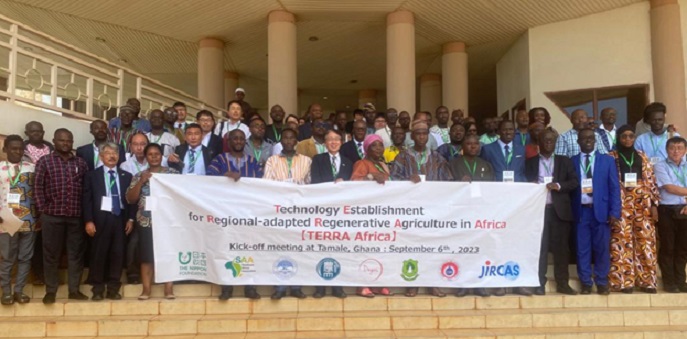Officials of JIRCAS with Dr. Paul Bosu, Director-General of CSIR, UDS Vice Chancellor Prof. Seidu Al-Hassan and other scientists at the launch
The Japan International Research Center for Agricultural Sciences (JIRCAS) has launched the Technology Establishment for Regional-adapted Regenerative Agriculture in Africa (TERRA Africa) Project at the University for Development Studies (UDS).
The project has been adopted this year as an overseas cooperation assistance project of the Nippon Foundation (TNF).
Recognizing the diverse environment surrounding smallholder farmers in Africa, JIRCAS propose the concept of “African regenerative agriculture technology” tailored for smallholder farmers in Africa, considering the ever-changing conditions of acceptance in the region.
The project is aimed to create an adaptive integrated package of technologies, which will be demonstrated in the field to ensure practical implementation.
The President of JIRCAS, Koyama Osamu, at the launch said the vast African savannah is facing at least four common food system challenges that necessitate change.
“The first is low productivity due to nutrient-poor soil, exacerbated by soil erosion and soil deterioration. The second challenge revolves around unstable production caused by seasonal rainfall, which is further aggravated by the impact of climate change.
The third challenge is the problem of fixed crop species and technologies, failing to keep pace with increasing demands and changing diets.
Last is the problem of vulnerable human resources for agricultural research and extension, which have struggled to adapt to new research and dissemination methods.”
According to him, the importance of soil health has grown significantly, especially in light of climate change and environmental conservation efforts and that regenerative agriculture, with its potential to restore soil health and contribute to climate change mitigation, is attracting worldwide attention noting that applying the technical approach of regenerative agriculture, which is predominantly used in large-scale agriculture in developed countries, to small-scale agriculture in Africa poses challenges.
“In this project, we aim to develop the AfRA technology to improve soil health in both wet and dry savannas in Africa, along with effective dissemination methods.
In addition, we will propose a prototype of an integrated technology package for each region, and rapidly transfer the technology for maximum impact,” he said.
Mr. Osamu disclosed that they will collaborate with domestic and overseas organizations, such as the Sasakawa Africa Association, to develop sustainable technology based on scientific knowledge that are suitable for the African savannah and can be practiced by small-scale farmers to contribute to sustainable food security.
“As we embark on this crucial endeavor, we humbly seek for your cooperation in making the TERRA Africa project a success. Together, let us work hand in hand to bring about positive change and prosperity to the agricultural landscape of African savanna.”
Dr. Paul Bosu, Director-General of the Council for Scientific and Industrial Research Institute, pledged his continuous support for the TERRA Africa Project.
“CSIR will do everything possible in our capacity to ensure that together with our partners, this project will be successful and we will make our resources and facilities available to the project and any other project,” he said.
By Eric Kombat, Tamale


